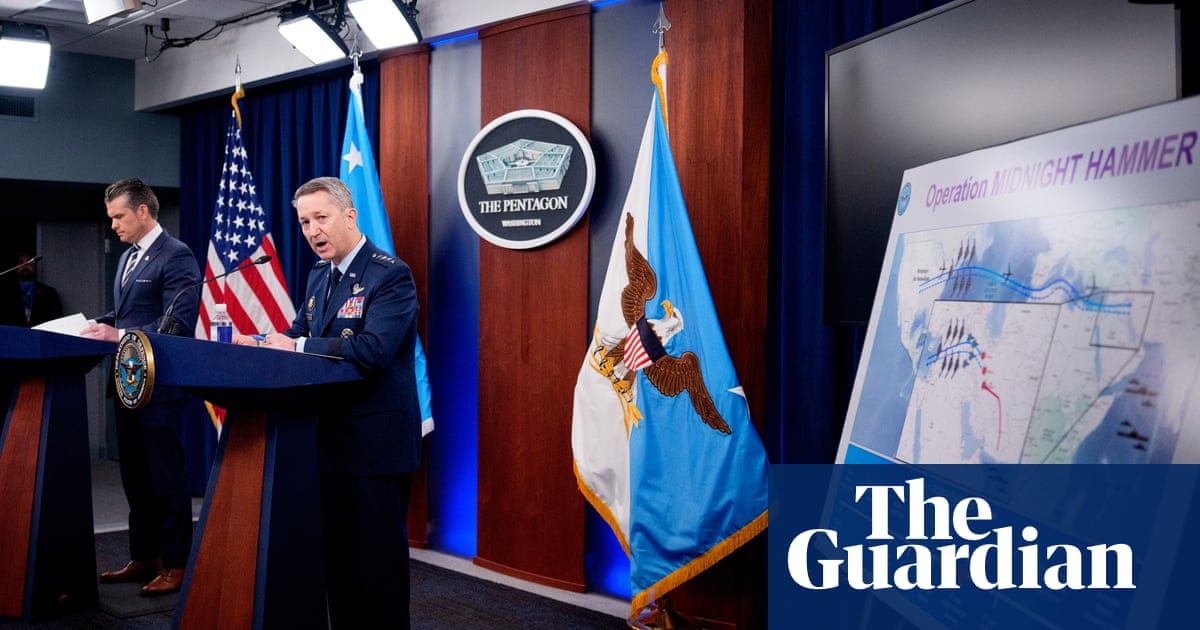For US allies and rivals around the world,Donald Trump’s strikes onIranhave redrawn the calculus of the White House’s readiness to use force in the kind of direct interventions that the president said he would make a thing of the past under his isolationist “America First” foreign policy.
From Russia and China toEuropeand across the global south, the president’s decision to launch the largest strategic bombing strike in US history indicates a White House that is ready to employ force abroad – butreluctantly and under the extremely temperamental and unpredictable leadership of the president.
“Trump being able to act and being willing to act when he saw an opportunity will definitely give [Vladimir] Putin pause,” said Fiona Hill, a former Trump national security adviser and one of the principal authors of the UK’s strategic defence review.
While Trump has pulled back from his earlier warnings about potential regime in Iran, going from tweeting “UNCONDITIONAL SURRENDER” to “NOW IS THE TIME FOR PEACE!” within 72 hours, he has nonetheless reinforced Russian perceptions of the United States as an unpredictable and aggressive rival that will not unilaterally abandon its ability to use force abroad.
“It has some pretty dire warnings for Putin himself about what could happen at a time of weakness,” Hill said. “It will just convince Putin even more that no matter what the intent of a US president, the capability to destroy is something that has to be taken seriously.”
It also shows a shift in the calculus in Washington DC, where hawks – along with Israel’s Benjamin Netanyahu – were able to convince Trump that launching a strike onIranwas preferable to pursuing negotiations that had not yet failed.
That could have knock-on effects for the war inUkraine, where Republicans and foreign policy hardliners have grown more vocal about Putin’s attacks on cities and the need for a tougher sanctions strategy. Although he hasn’t changed his policy on resuming military support to Ukraine, Trump has is publicly more exasperated with Putin. When Putin offered Trump to mediate between Israel and Iran, Trump said he responded: “No, I don’t need help with Iran. I need help with you.”
In the immediate term, however, the strikes on Iran are unlikely to have an impact on Russia’s war in Ukraine.
“I don’t see it as having a big impact on the Ukraine war, because although Iran was very helpful at the beginning stages inproviding Russia with [Shahed] drones, Russia has now started manufacturing their own version and have actually souped them up,” said Max Boot, a senior fellow at the Council on Foreign Relations, during a roundtable discussion.
More broadly, Trump’s attacks could undermine a growing “axis of resistance” including Russia andChina, given the pair’s reluctance to come to Iran’s aid beyond issuing strong condemnations of the attacks during security discussions under the Shanghai Cooperation Organisation (SCO) being held in China this week.
“It also shows that Russia is not a very valuable friend, because they’re not really lifting a finger to help their allies in Iran and returning all the help that they’ve received,” Boot added.
The strike could also have implications for China,which has escalated military pressure around Taiwan in recent monthsand has been holding “dress rehearsals” for a forced reunification despite US support for the island, according to testimony from Adm Samuel Paparo, the commander of US Indo-Pacific Command.
Trump had promised a tough line on China, and many of his top advisers are either China hawks or believe that theUS militaryshould reposition its forces and focus from Europe and the Middle East to Asia in order to manage China as a “pacing threat”.
Sign up toThis Week in Trumpland
A deep dive into the policies, controversies and oddities surrounding the Trump administration
after newsletter promotion
Yet his previous hesitance to use US force abroad could have emboldened Beijing to believe that the US would not come to the direct aid ofTaiwanif a military conflict would break out – the one wild card in what would otherwise likely be a lopsided conflict between China and Taiwan.
Experts cautioned that the stakes are far different, and the conflicts too far removed, in order to draw direct conclusions about Trump’s readiness to intervene if a conflict broke out between China and Taiwan. Trump’s administration appears further embroiled in Middle East diplomacy than it wanted and its pivot to focus on China has been delayed as well.
And while some close to the military say the strikes have regained credibility lost after some recent setbacks, including the withdrawal from Afghanistan, others have said that it won’t send the same message for military planners in Moscow or Beijing.
“We shouldn’t conflate willingness to use force in a very low risk situation with deterring other types of conflicts or using force when it’s going to be incredibly costly – which is what it would be if we were to come to the defence of Taiwan,” said Dr Stacie Pettyjohn of the Center for a New American Security during an episode of the Defense & Aerospace Air Power podcast.
Around the world, US rivals may use the strikes to reinforce the image of the US as an aggressive power that prefers to use force rather than negotiate – a message that may break through with countries already exhausted with a temperamental White House.
“The fact that it all happened so fast, there wasn’t much multilateral involvement or chance for diplomacy, I think, is something Russians can point to as an indication of, you know, imperialism to the global south,” said Aslı Aydıntaşbaş, a fellow in the Center on the United States and Europe at Brookings during a conference call. “But also in their talking points to United States and western allies, they will definitely make a point of highlighting this as something great powers do, and in a way that normalizes Russia’s language on its own [conflicts].
